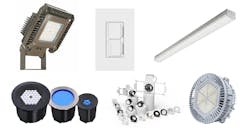I have been doing electrical work for more than 30 years, and I really enjoy it. Over the past three decades, I’ve learned a lot about service and repair work. The electrical service and repair business, however, is much different than the new construction side of the business — especially when it comes to materials.
Back in the days when we bid on construction projects, we focused on price because we had to be the cheapest to win the job. Today, we choose quality over pricing because of the excellence we strive to provide as well as the guarantees we offer our customers.
On construction projects, you typically only have to get past the one-year mark on your warranty, and then the owner is responsible for system maintenance and repair. Many times, you’re forced to buy lower-grade products, as long as they meet the general specifications on the plans, to be the lowest bidder. But now that we are mainly focused on service and repair work, we need to purchase the best materials we can. A call back for an inferior material item can be costly, and it’s not in the best interest of the customer. Most of our warranties last three years, and many of our products come with a lifetime warranty. Needless to say, when you’re providing these long time frame warranties, you have to buy the best.
I won’t name any manufacturers, but here are a few tips that may help you purchase the best.
Conductors — We only purchase copper conductors in our business. I know aluminum manufacturers have come a long way in their aluminum conductor processing, but, in my opinion, nothing beats copper when it comes to longevity and durability. We even install copper wiring for the main service entering homes or businesses. Copper does not corrode or oxidize as badly as aluminum, especially when located outdoors. I still see some contractors using aluminum wiring for the range, dryer, and even HVAC circuits. I see this with new home builder contractors because they are typically trying to get the work based on the lowest possible price. We encounter many more problems with aluminum conductors than we do with copper conductors. Yes, we have to charge more for the copper wiring, but in the long run it builds more value than aluminum. We would rather not risk a call back or warranty issue over saving a few dollars for wiring.
Ground rods — We only purchase and install copper ground rods. I know we can purchase less expensive galvanized ground rods, but it’s not worth the risk. Studies show that galvanized ground rods only have a lifespan of about 10-15 years in average soil conditions while copper ground rods have a lifespan of 50+ years. All metals eventually dissolve back to the earth they came from. Copper stays conductive longer to the soil and is a better path for electricity to flow should a fault occur or lightning strike. We’ve pulled up many ground rods that were supposed to be 8 ft and only a few feet came out. The remainder of the ground rod had deteriorated in the soil.
Panels — Panels with a lifetime warranty are the only ones we carry and install. Our philosophy is that it should be the one and only panel a person buys in his or her lifetime. I’ve found that most panels with lifetime warranties are built better and have copper bus bar components. In the Carolinas, we can install panels outside, and the copper bus bar holds up much better to the outdoor elements. This, in turn, causes less call backs and warranty claims. Regardless of the money savings, sitting in the dark because you lost power is not worth it. Typically, by the time a burnt panel is found by aluminum bus bar corrosion, it’s too late to repair — and an entirely new panel is required. That’s why we purchase and install copper bus panels with lifetime warranties.
Be cognitive of your equipment and the warranty it carries. When running an electrical service and repair business, time is money, and you can’t afford to use cheap materials.
Wise holds an A.S. degree in Electrical Engineering and is licensed in N.C., S.C., and Va. In addition to being a college electrical instructor, N.C.-licensed real estate broker and former NASCAR race car driver, Wise owns and operates Mister Sparky in Charlotte and Cherryville, N.C. He can be reached at [email protected].



